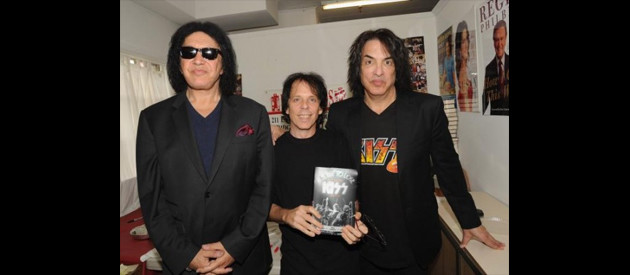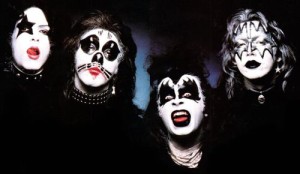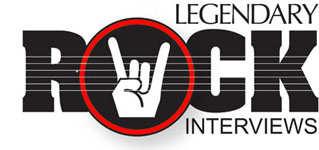KISS Author Ken Sharp: “I know there are some fans who thought this would somehow be an Ace and Peter bash-fest; it isn’t that”

Ken Sharp is one of my favorite authors, having written numerous great rock books including “Behind The Mask”, considered by many to be one of the most definitive books written about KISS. Sharp recently returned to the subject, with the cooperation of Gene Simmons and Paul Stanley, to release “Nothin To Lose, The Making of KISS” which delves even deeper into the real beginnings of the soon-to-be Rock and Roll Hall Of Fame icons. I recently caught up with Ken to talk about the creation of the book and more; read on….
Legendary Rock Interviews: Hi Ken, thanks for taking the time to talk to me. Your earlier KISS book, “Behind The Mask” was very well received by the fanbase and I think considered even more of a KISS “Bible” than KISSTORY. I really doubted you could equal or top it with your latest book here but they are both truly great books. Did the reaction to “Behind The Mask” influence you or drive you while working on “Nothin To Lose”?
Ken Sharp: Thank you John, first of all. To answer your question, not particularly. I’m even happier with “Nothin To Lose” to tell the truth. I’m really proud of “Behind The Mask” but this is a whole different entity because “Behind The Mask” covered more of a wide gamut of time where “Nothin To Lose” basically covers a three year period from 1972 to 1975. To be honest, I might be a little more proud of this one than I am “Behind The Mask”. I think because of its focus and its wide swath of various voices that tell the story, it’s something I’m really proud of . I do think it succeeds at bringing you into that world to the point where you really feel like a fly on the wall as you see the band deal with the trials and tribulations they face while reaching the top of the mountain.
LRI: Obviously you did a ton of work on this book but Gene and Paul’s names are on the book as well. How much and in what ways did they contribute to the making of “Nothin To Lose”?
Ken: They were certainly involved and were looking at the progress of what I was doing, in addition to making themselves available for interviews and things of that nature but I certainly led the way because they obviously have a lot of other things going on in their lives (laughs). As you can understand. But they were very, very supportive. The other thing is, when the book was done and they read it from start to finish again, they really had nothing that they asked to be changed. I know there are some fans who thought this would somehow be an Ace and Peter “bash-fest” but I’m really glad that, since the book has been out, they’ve seen that it isn’t that. There was certainly an all for one spirit at that point in the band’s history and a sense of community in the band and I think that’s reflected in the book but I also think that’s a big part of the reason I was attracted to that period of the band’s history to begin with because later periods in their career are really mired by a lot of acrimony between the band members, certainly in the divisions between Paul and Gene and Ace and Peter. I felt that those early years were a much more interesting arc, story wise because you are right there with them when they go through all these battles together as a unit. Getting back to Paul and Gene’s involvement, I was very pleasantly surprised and quite happy that they allowed things in the book that certainly weren’t all pro-KISS or even pro them! I think that was very honorable of them and I was really proud that I was able to work with them in such a fashion. Like I said, they have so many other projects surrounding KISS so I was really the driver of the whole thing but it was great to have them be so supportive during the process.
LRI: Paul Stanley is VERY clear in his quotes that he really took a pretty romantic view of the tough times while the band was coming up. He felt it would just make for good memories after they reached the top. Now with the Rock and Roll Hall of Fame Induction looming there’s so much fan opinion about the individual KISS members’ overall importance or levels of dedication. Do you believe the other three guys really felt as strongly as Paul that those dues paying days were just a stepping stone and a point of pride early on?
Ken: Yeah, I do. I really think that it was something that was just contagious and something that was shared by all of them. Maybe at the time it was just being naive in their belief that if you work really hard and are unblinkered in your devotion to your craft then you’re gonna do it. They are really the perfect example of a group that put on blinders and believed in themselves, not listening to anyone who was saying “Hey, take the makeup off” or “What you guys are doing is ridiculous”. You should read some of the reviews that were written, especially when they first came out but even those that continued through the 70s, reviews that basically just viewed them as a here and now joke. They basically stated, over and over, that they were a band that wouldn’t even be around the next year and now look at KISS’s legacy 40 years on (laughs). They are still thriving and still working and I think that Gene and Paul especially had that shared work ethic but I also think that Ace and Peter, to some extent, did as well. I think when you have four people on the same page with their goals and ambitions, as they were in those early years, I think that can be a really, really powerful thing. They were able to harness that, against all odds, and succeed.

Should be in any KISS fan’s library….
LRI: One of the great things about your writing style is how you stick to the quotes and interviews to really move the story along but there are SOOOO many different folks interviewed here. That had to be an extraordinary undertaking, were many of the interviews much harder to coordinate or nail down?
Ken: It was very difficult and I basically had to track down everyone to do firsthand interviews with all of these people but I really prefer to do that with my projects. I don’t like to take the easy way out and pull from other sources. There are a few instances in the book where it was necessary, for instance Neil Bogart. Neil has been deceased for decades but his voice is in the book and I felt it was crucial and it comes from other sources which I cite in the back of the book but I would say about 99% of the interviews were done by me, firsthand. I kinda take it as a challenge and I’m pretty vigilant and don’t easily give up when it comes to trying to track down people for my stuff. Also, as you always find one person it can lead to another person so it’s a pretty interesting puzzle that gets put into play when you’re doing such a book. I actually enjoy the aspect of searching for people and finding people and it’s certainly a big payoff when you find someone who has some fascinating information that brings something new or unique to the story.
LRI: There are some great photos in the middle of course but what really impressed me were the photos throughout the book, I can’t even think of them all but certainly a lot of the old, old photos from Rik Fox who saw the guys at their earliest shows and a few of the Cadillac, Michigan ones were among many I’d never seen before. It’s easy for us as fans to feel like we’ve seen everything but your book proves that’s not the case. Were there points in making this book that you saw things you’d never seen before?
Ken: Like a lot of really hardcore KISS fans, I definitely have seen a lot like a lot but there were certainly things I came across while doing the book that I hadn’t seen before. Some of the real special photos for me were the photos taken by Eddie Solan who was KISS’s original roadie/soundman in 1973. Eddie took a series of really great photos while the band was recording their first album at Bell Sound Studios in New York. For a KISS fan, that was always a dream, to be able to see photos of the guys without makeup, in the studio, in their heyday, working on a record. There were a batch of those photos, there’s only a selection of those in the book but still, those are the ones that just blew me away as a fan to be brought into the studio at that time and see what the guys were looking at there at that point when things were just starting to happen for them was really, really rewarding for me.
LRI: That white guitar Ace is playing in those photos, you just never see him or anyone for that matter really, playing anything like that, very cool.
Ken: Yeah, that was a white Ovation Breadwinner guitar, a really unusually shaped instrument, you never would have expected that or Paul playing a black Gibson Les Paul. There’s just various little things that are cool to notice in the studio which is pretty interesting to look at in of itself, there are a lot of oranges and reds and Bell Sound Studios is a pretty psychedelic looking studio to begin with. Those pictures are just yet another puzzle piece to bring you into that world. My game plan for this book was to create a documentary about the band on paper and bring in all of these different voices and characters to flesh out the story. Most KISS fans sort of know the basics of the band’s story but in this instance, in this timeframe, they had probably only heard it told from a few people’s narratives, namely one or two people in the band. In contrast, in this instance when you’re hearing about Cadillac High or you’re hearing about their first tour of Canada you aren’t just hearing from the band themselves, you’re hearing from so many other principals and people that were involved who give it all a different perspective and add much greater depth to what you may already know.

LRI: There are so many points where you are reading “Nothin To Lose” and thinking ‘Ok, this is something that could have permanently derailed the band’, whether it’s the finance stuff or the girls or even a pyro disaster that could have happened. Do you think there were numerous cases of tragedy or total failure being narrowly avoided?
Ken: I definitely think there were moments in their career where things could have been derailed in a pretty remarkable fashion. Just think of their first coming out gig in New York at The Academy of Music, December 31st 1973. They were on the bill with Blue Oyster Cult, Iggy and The Stooges and Teenage Lust and in that show two things went wrong. One was Gene blew fire for the first time and his hair and whole side of his head caught fire and secondly when they were doing a trick where Gene was throwing out a fireball the ball of fire sadly landed on the face of a fan and burned the person’s face. That could have easily been a career ending type of situation but there were a lot of other situations or instances in their career where things went wrong which could have easily spelled their doom but fate was on their side and I think that history proves that these guys have managed to carve out their own, singular path on the road to rock and roll glory.
LRI: As good as the book is it of course leaves me wanting more and wanting the story to continue with that same attention to detail. Are you thinking of doing a sequel and picking up the story starting with the creation of Destroyer and beyond?
Ken: It’s crossed my mind but the amount of work that went into putting “Nothin To Lose” together was pretty daunting (laughs) so I’m not sure I wanna throw myself back into something like that and the other aspect is that the story would be a lot different. It would be darker, a much more negative story because, while they were achieving enormous heights of fame around the world there were a lot of divisions that were forming within the band and certainly a lot more drug and alcohol abuse and inner band turmoil. Certainly while that would make remarkable and certainly engrossing reading it would be a much more negative part of their career to take such a close look at and chronicle but you know…I’m open to it. Right now, I’m working on some other book projects that are not KISS related but it’s a possibility, just not something I’m thinking about right now.
LRI: Any book ideas you can mention?
Ken: I’m finishing up a book on a famous group of session musicians from the 60s called “The Wrecking Crew” who played on classic hits like “Be By Baby” by The Ronettes or “Good Vibrations” by The Beach Boys or “California Dreamin” by The Mamas and Papas or “I Think I Love You” by The Partridge Family or “ABC” by The Jackson Five which is a really interesting book done in that same format as “Nothin To Lose”. I love that oral history format which it sounds like you’re also a fan of.
LRI: I am, absolutely. Also I need to read why Danny Bonaduce or Tito Jackson weren’t playin on those records (laughs)
Ken: (laughs) There are a lot of new and unique insights into some really classic music that we all know and love I can tell you that and I think that this book in particular really takes advantage of that format. Again, I think that is a great tool to bring the reader into the heart of the story and allow the main principals to tell the story.
LRI: I’m from the Rockford, Illinois area so I have to ask you before I let you go…any chance of your Cheap Trick book “Reputation is A Fragile Thing” coming back into print? It is extremely hard to find.
Ken: There is a possibility about that one actually, I’ve been speaking with Mike Hayes who I worked with on that one, he was the main author on that book and is just such a super guy. We’ve been talking about that so there is potentially a chance that could come back in some form. That’s a book that I’m really proud of and a band that I absolutely think the world of, definitely one of my favorite groups.
LRI: They are definitely in my top 5 for sure. Thanks for talking with me Ken, it was a pleasure.
Ken: Well, you have great taste in music John. Thank you and take care!
To buy Ken Sharp’s book “Nothin To Lose, The Making of KISS” click here
Category: Interviews




Great Interview as usual John! Ken was a super great guy to work with on this KISS book and I am so very grateful that he was the one, (out of all the previous KISS book authors) who saw and felt that my story and memories were just as integral to the mix with all the other cool people interviewed for the book, and saw to it that I finally got the chance that all the previous KISS authors missed and overlooked interviewing me, I’m thoroughly happy that it was Ken with whom I was able to provide that story of the early days of my getting to see KISS form from the ground-up, and my knowing Peter (Criss) and his family before he was in KISS. It was even better seeing Gene validate whatever it was that I was talking about in the book too. All I can say is, Oh MAN! You SHOULDA BEEN THERE! I got to see the magic as it happened.
Cheers to you both!
A great read, thoroughly enjoying it. I’d like to second that I would love a sequel, or even series of sequels spanning the entire carer of the band. One of the best band bios I’ve read and so good to read so many different aspects and accounts of how things occurred.